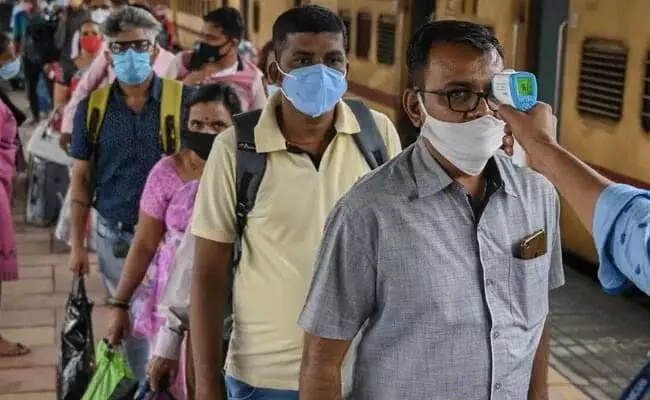Holiday season brings rise in Covid-19 cases; Omicron sub-variant JN.1 detected in Kerala
Recently, China has been facing pneumonia-like cases, which can also be a cause for worry in case of international travel from China.
By Sulogna Mehta
Hyderabad: As the holiday season is about to commence, there seems to be an uptick in Coronavirus cases in the country and cases of new sub-variants have also been detected.
As per the Covid registry, over the last weekend, 335 new Covid-19 cases and five deaths were reported while the total number of active caseloads in the country till December 18 at 8 am is 1,828. Four out of five deaths have been reported from Kerala and one from UP. Most of the active cases have also been reported from Kerala (1,144 active cases as of December 15).
According to the Ministry of Health, the national recovery rate is 98.81 per cent while the fatality rate is 1.19 per cent. So far, as per official data, over 5.33 lakh people have died of Covid-19 in India while the total caseload so far is around 4.50 crore.
Omicron’s sub-variant JN.1
After genome sequencing of the virus, the variant JN.1 was identified in an elderly woman in Thiruvananthapuram district in Kerala on December 8 who had a mild influenza-like illness but has now recovered from the virus.
This sub-variant was first detected in the US in September 2023 and was declared by the World Health Organisation (WHO) as a variant of interest last month, with 27 per cent of global Coronavirus cases conforming to this variant.
According to Centres for Disease Control and Prevention (CDC), JN.1 causes mild gastrointestinal problems such as abdominal pain and diarrhoea apart from the usual Omicron symptoms such as fever, sore throat, headache etc.
Risks from inter-state and international travels
Inter-state travel usually increases during Christmas and New Year, between December and January, followed by Makara Sankranthi holidays during mid-January, thereby causing the virus to spread faster.
During the Christmas holidays, Indians working abroad – especially from the US, the Gulf countries and even from China – head home to India and they can be potential carriers.
Recently, China has been facing pneumonia-like cases, which can also be a cause for worry in case of international travel from China. Apart from Indians returning to their home country, foreign tourists also flock to India, especially in the winter season, visiting places such as Goa, Rajasthan, Delhi-Agra circuit etc. They can also transmit various strains of Coronavirus among the local population. Given the risk factors, screening at airports needs to be tightened this season.
No need to panic, wear masks
While assuring the public that there is nothing to panic about the new variant, Dr Kiran Madhala, professor and anaesthesiologist at Nizamabad Government Hospital said, “JN.1 is a sub-variant of Omicron’s BA.2.86 strain and the symptoms are more or less similar to those of Omicron variants. Its prevalence is 27 per cent globally and around 12 per cent in India as per the results of sample testing. Covid is now just like any other respiratory ailment such as swine flu or SARS. However, during the holiday season and also due to changes in weather conditions, the elderly and people with co-morbidities should exercise caution. The public can safeguard against the virus if they wear masks in crowded places and maintain hand hygiene.”
Centre's advisory to states on Covid-19
Given the recent surge in coronavirus cases in the country along with detection of Omicron sub-variant JN.1in Kerala, the Centre has issued advisory to the states. The states have been told to take required public health measures to minimise the risk of virus transmission in the festive season.
As per the advisory, states have been urged to maintain a state of constant vigil over the COVID-19 situation. States should report & monitor district-wise Severe Acute Respiratory Illness (SARI) and Influenza-Like Illness (ILI) cases on a regular basis including updating on the Integrated Health Information Platform (IHIP) portal.
States have also been advised to ensure adequate testing including a higher number of RT-PCR tests, and send positive samples for genome sequencing to Indian SARS CoV-2 Genomics Consortium (INSACOG) laboratories to enable timely detection of new variants, in any, in the country.
The states have been asked to promote community awareness including adherence to respiratory hygiene.